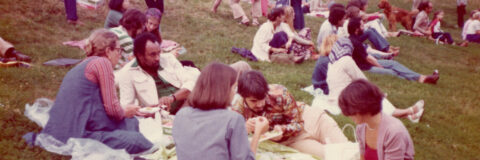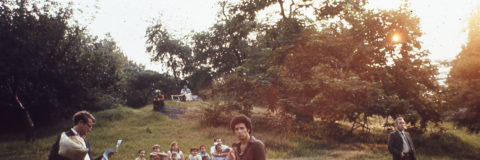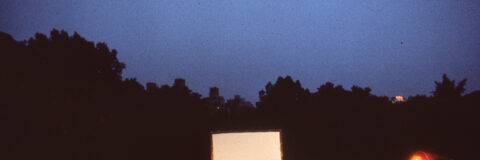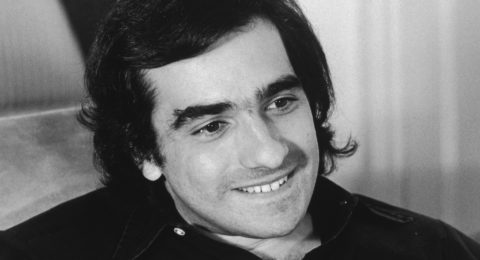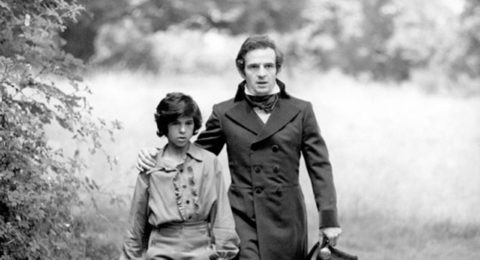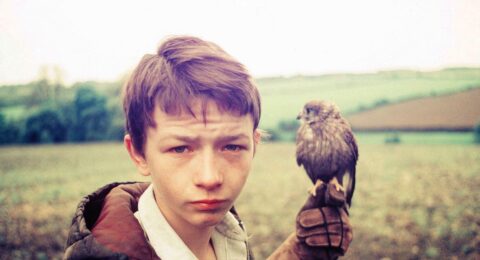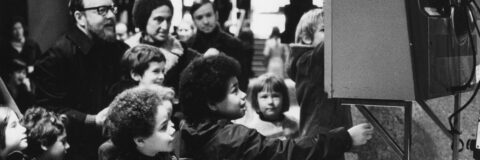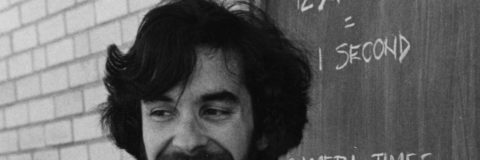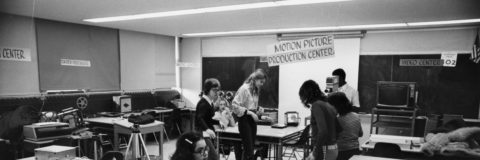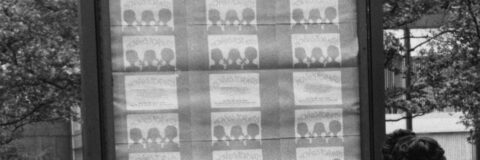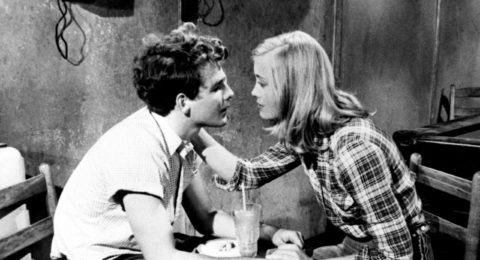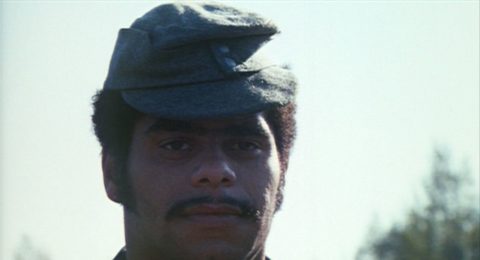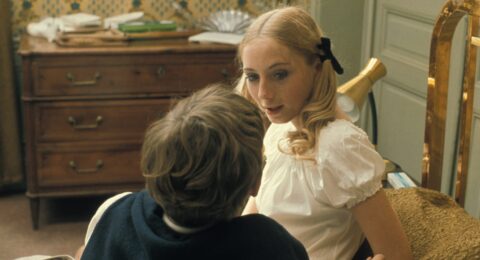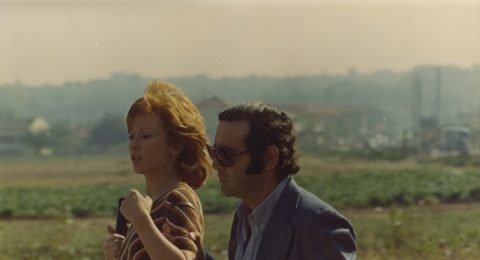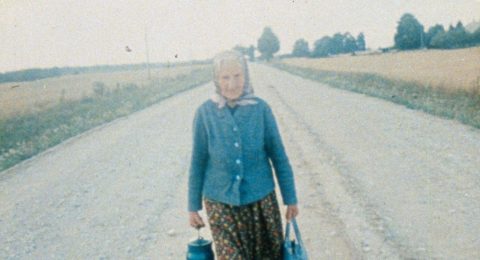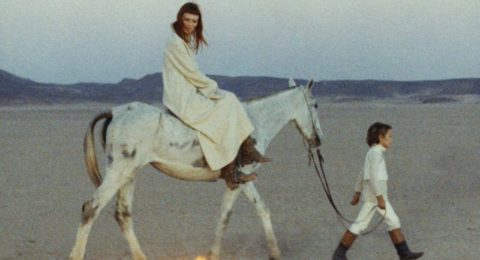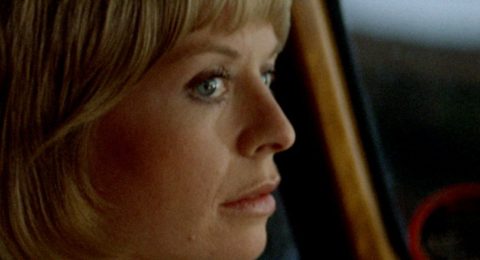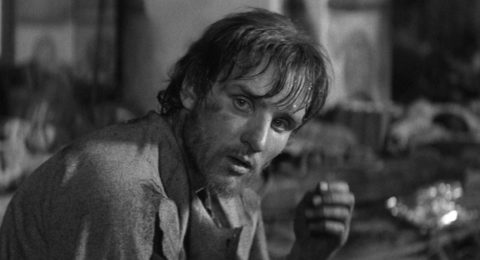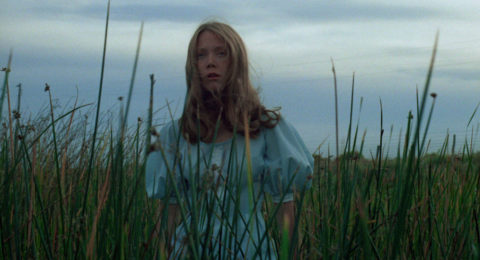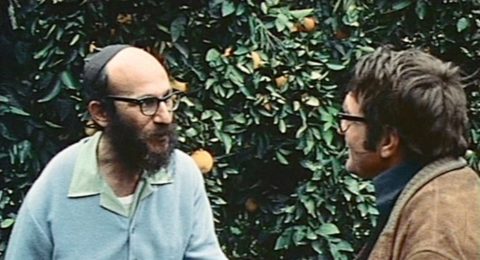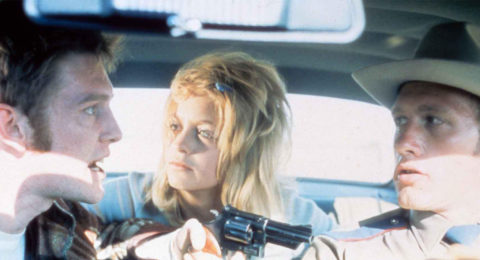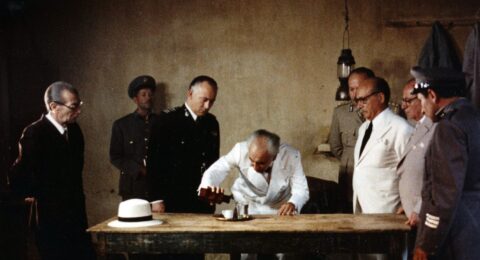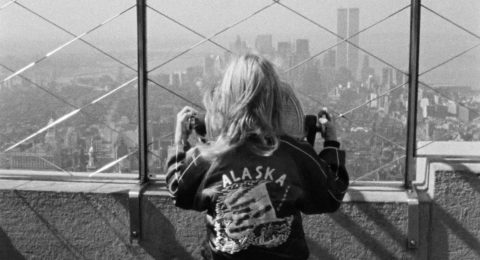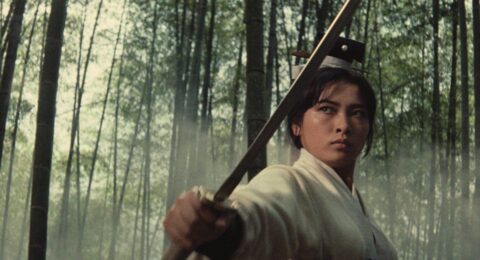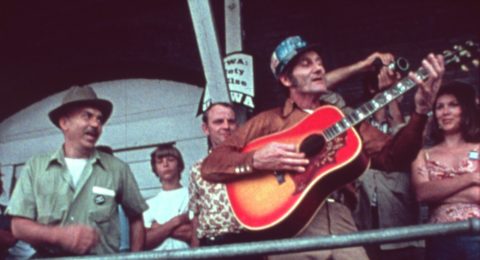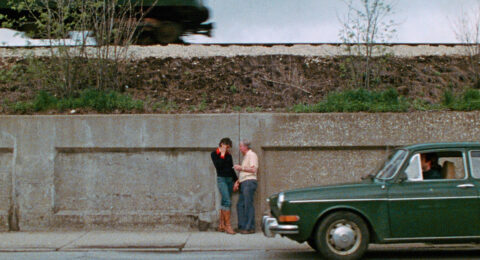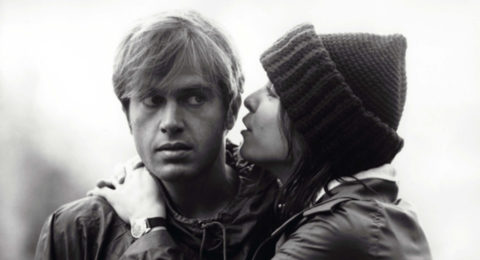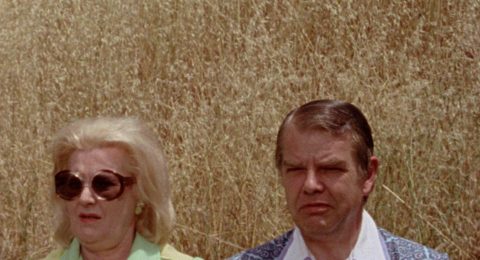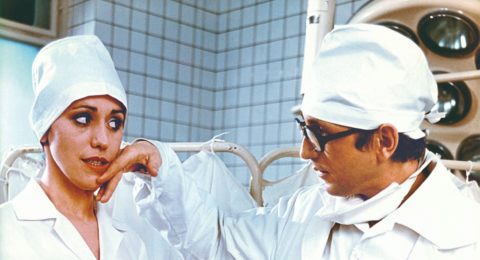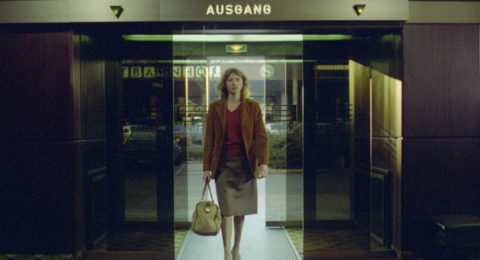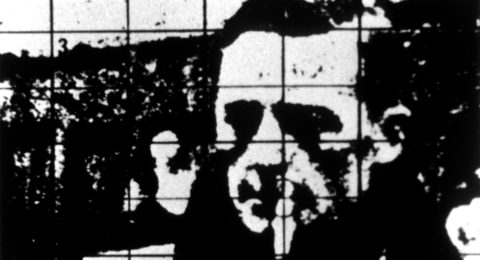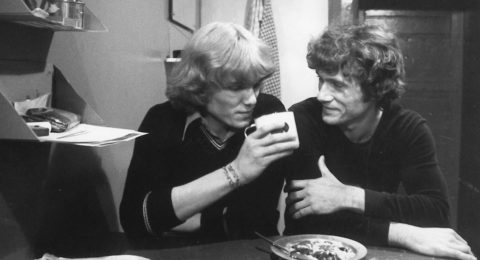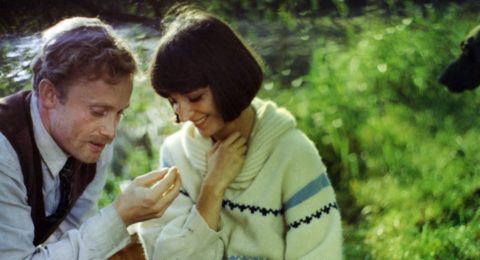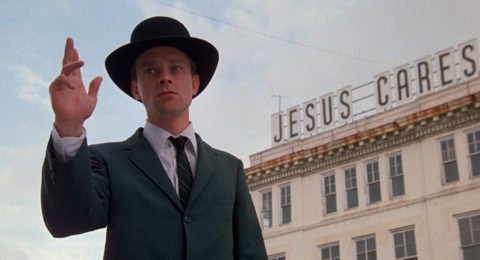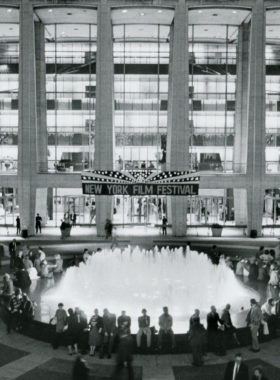
Founded in 1969, FLC is committed to preserving the excitement of the theatrical experience for all audiences, advancing high-quality film journalism through the publication of Film Comment, cultivating the next generation of film industry professionals through our FLC Academies, and enriching the lives of all who engage with our programs.
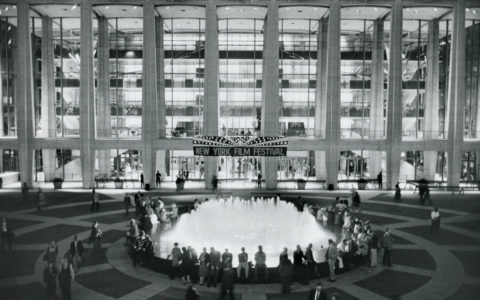
1970
Movies in the Parks Begins
Among the Film Society’s very first initiatives was a collaboration with the New York Department of Cultural Affairs that began in 1970 to present outdoor park screenings of short independents in all five boroughs. Funded by both the city and the New York State Council on the Arts, with commercial sponsorship from Miller beer, Movies in the Parks was a mobile film series, projecting selected films on a large screen on the back of a truck, which moved from borough to borough. The summer program, which ran until 1976, consisted of a wide variety of shorts, showing such eclectic films as Pigs!, from future Black Stallion director Carroll Ballard, and Joyce Chopra’s feminist landmark Joyce at 34. Summer screenings en plein air would eventually become a staple of New York moviegoing. The Film Society would return to the concept in 2018 with its Escape in New York: Outdoor Films on Governors Island.
NYFF Debuts
NYFF8 Main Slate Selections
The Wild Child (François Truffaut) with The “What Did You Think of the Movie?” Movie (Jeremy Paul Kagan) (Opening Night)
Tristana (Luis Buñuel) with Visages de femmes (Peter Foldes) (Closing Night)
Le Boucher (Claude Chabrol) with Henry 9 ’til 5 (Bob Godfrey and Bev Roberts)
The Cannibals (Liliana Cavani) with Bleu Shut (Robert Nelson)
Comrades (Marin Karmitz) with Making “Love” (Finbar Harvey)
The Conformist (Bernardo Bertolucci)
The Crucified Lovers (Kenji Mizoguchi) (Retrospective selection)
Days and Nights in the Forest (Satyajit Ray)
Even Dwarfs Started Small (Werner Herzog) with The Want-Ad (Bernd Upnmoor)
Five Easy Pieces (Bob Rafelson) with Arena (István Ventilla)
From Lumiere to Langlois: The French Silent Cinema (Henri Langlois) with Langlois (Elia Hershon & Roberto Guerra)
The Garden of Delights (Carlos Saura) with Even the Sun Cries (François Bel)
Harry Munter (Kjell Grede) with Three Days (Phillip Frey)
The Inheritors (Carlos Diegues)
Je t’aime, je t’aime (Alain Resnais) with Invasion (Stefan Schabenbeck)
Kes (Ken Loach) with Hands, Knees and Bumps-a-Daisy (George Dunning)
Mistreatment (Lars Lennart Forsberg) with The-End-of-One (Paul Kocela)
La Musica (Marguerite Duras & Paul Seban) with Subterraneans (Roberto E. Castro)
Othon (Jean-Marie Straub & Danièle Huillet) with Reunion (Gerry Matthews and Ton Scheuer)
Praise Marx and Pass the Ammunition (Maurice Hatton) with Richard Hamilton (James M. Scott)
The Scavengers (Ermanno Olmi) with P.B.L. #2 (Robert Breer)
Une simple histoire (Marcel Hanoun) with Kyoto (Kon Ichikawa)
The Spider’s Stratagem (Bernardo Bertolucci) with The Battle (Derek Phillips)
Street Scenes 1970 (Martin Scorsese) with The Golden Positions (James Broughton)
Wind from the East (Groupe Dziga Vertov and Jean-Luc Godard and Jean-Pierre Gorin) with The Giants (Gene Deitch)
Zorns Lemma (Hollis Frampton) with Double Pisces, Scorpio Rising (Dick Fontaine)
1971
Film in Education Begins
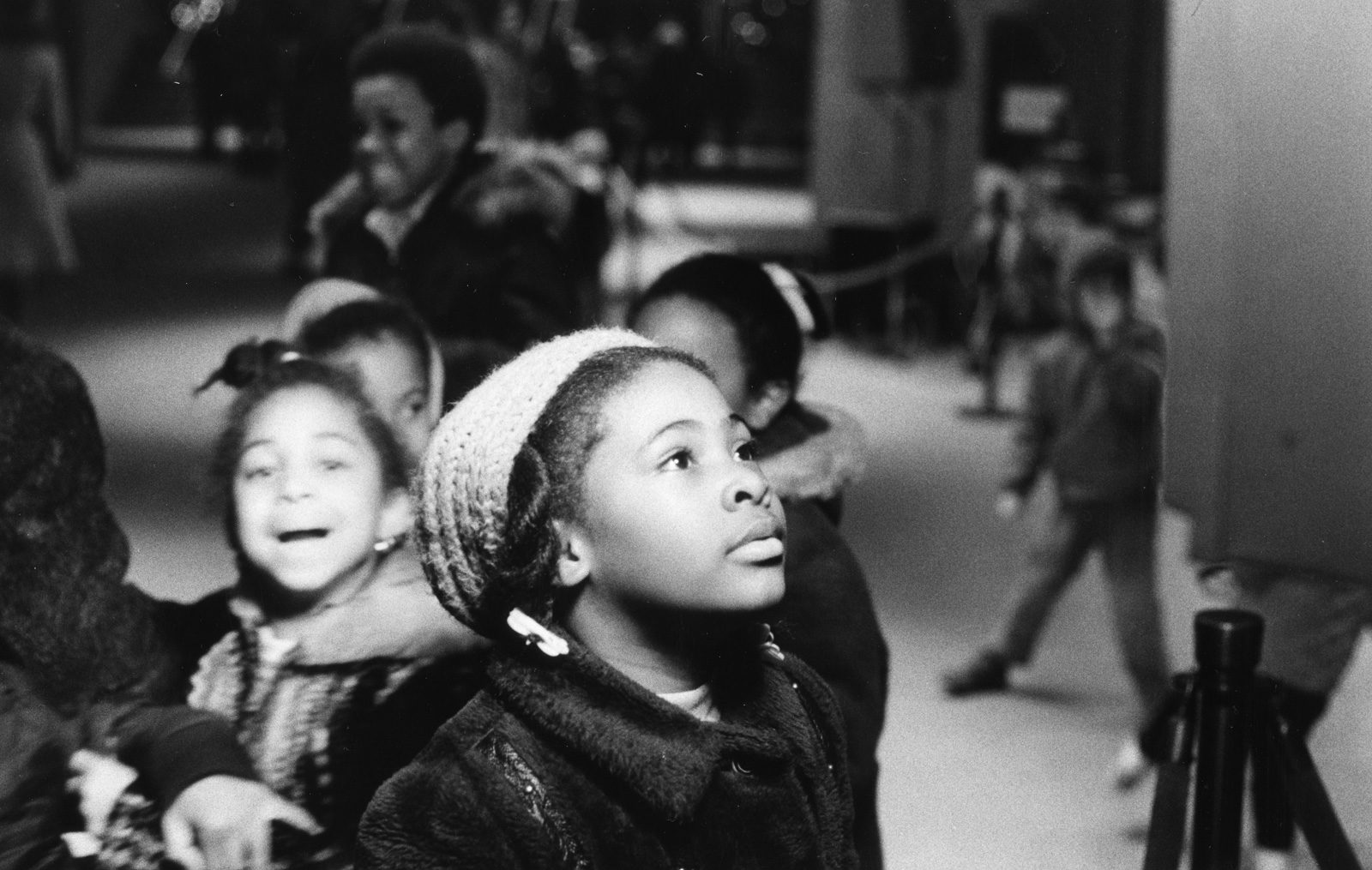
Bringing cinema to youth has always been a priority for the Film Society. The first program of its Film in Education initiative was Movies for Kids, presented in the vast space of Alice Tully Hall. Starting in 1971 and funded by The Helena Rubinstein Foundation, Movies for Kids was geared toward the young, though the selections were intended as movies made for adults that could have meaning and entertainment value for children, such as The Secret Life of Walter Mitty, Heidi, and Singin’ in the Rain. “An adult can come. We don’t encourage them; we don’t discourage them,” Wendy Keys, the director of the series and eventual Film Society Associate Director, told The New York Times. Though this particular series would prove short-lived, Film Society of Lincoln Center continued to create programs for young people throughout the coming years, and has increasingly made education one of its prime initiatives. The ongoing Film in Education programs aim to broaden and diversify art-house cinema audiences and future filmmakers. In 2014, FSLC began bringing film into the classroom through screenings, discussions, and production, in order to bolster visual literacy learning in neighborhood elementary schools. Today, Film in Education serves more than 700 kids in public schools on the Upper West Side.
NYFF Debuts
NYFF9 Main Slate Selections
The Debut (Gleb Panfilov) (Opening Night) with Replay (Robert Deubel)
Murmur of the Heart (Louis Malle) (Closing Night)
Bonaparte and the Revolution (Abel Gance)
Born to Win (Ivan Passer) with I Never Promised You a Long Run (Paul Leaf)
The Decameron (Pier Paolo Pasolini) with The Further Adventures of Uncle Sam (Dale Case and Robert Mitchell)
Directed by John Ford (Peter Bogdanovich) with What Fixed Me (Thomas Rickman)
Dodes’ka-den (Akira Kurosawa)
Family Life (Krzysztof Zanussi) with Passing Quietly Through (Dinitia Smith McCarthy)
Fata Morgana (Werner Herzog) with ’70 (Robert Breer) and Nostalgia (Hollis Frampton)
Four Nights of a Dreamer (Robert Bresson) with New Arts (Howard Chesley and Eric Saarinen)
In the Name of the Father (Marco Bellocchio) with Mummy, Mummy (John Beech)
In the Summertime (Ermanno Olmi) with Little Man, Big City (Gyula Macskássy and György Várnai)
The Last Picture Show (Peter Bogdanovich) with Abraham and Isaac (R.O. Blechman)
Pioneers in Ingolstadt (Rainer Werner Fassbinder) with The Caterpillar and the Wild Animals (Gerard H. Baldwin) and The Last Winters (Jean-Charles Tacchella)
Punishment Park (Peter Watkins) with Fable Safe (Erik Barnouw)
A Safe Place (Henry Jaglom) with Synchromy (Norman McLaren)
The Sorrow and the Pity (Marcel Ophuls)
W.R.: Mysteries of the Organism (Dusan Makavejev) with A Child’s Alphabet with Casual References to DNA Replication in the Garden of Eden (Thomas Spence) and Work (Fred Wardenburg)
1972
The First Chaplin Award Gala
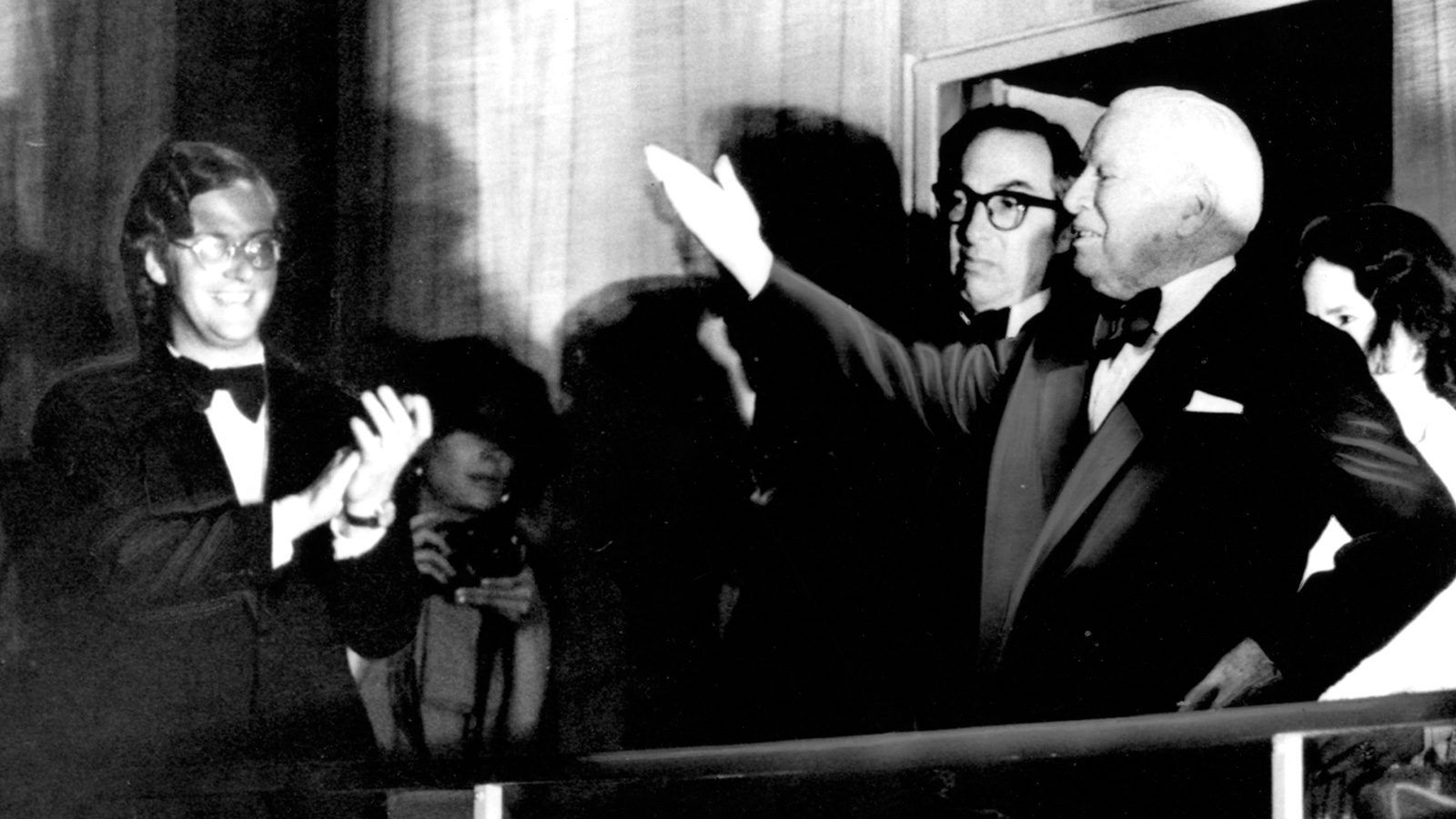
Charlie Chaplin in 1972 at the Chaplin Award Gala. Photo by Newsday.
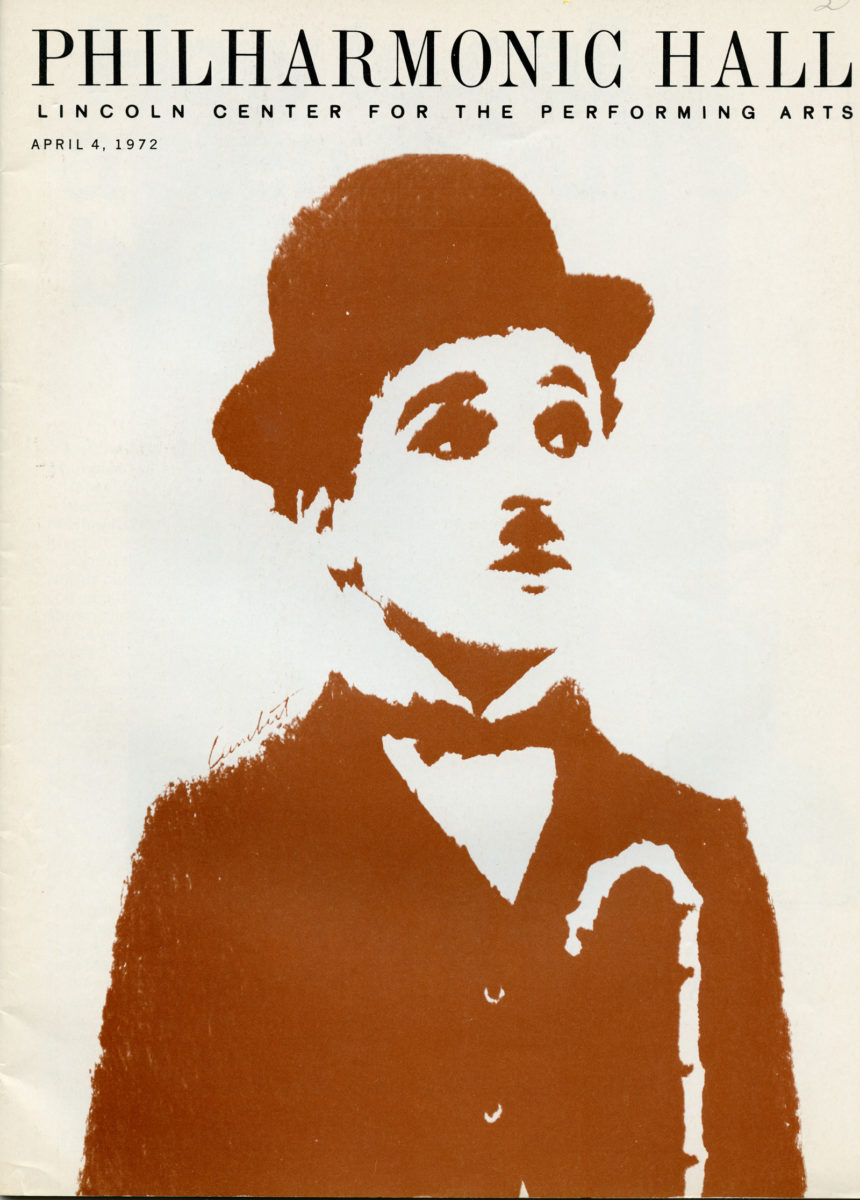
The first of what would become the Film Society of Lincoln Center’s annual galas took place on the evening of April 4, 1972. The honoree was none other than Charlie Chaplin, returning to the United States after 20 years in exile. The night included a screening of a brand-new print of Chaplin’s 1921 classic The Kid. Martin Segal recalls of that emotional evening:
“Charlie and [wife] Oona sat in a box facing the stage, and when the lights came up, the audience rose to its feet and greeted them with warm, thunderous applause. After reducing us to tears so many times over the years, we finally had the opportunity to return the favor. As he wiped the tears from his eyes, he simply repeated the words ‘thank you.’”
In years since, this gala has become the cornerstone fundraising event of the Film Society of Lincoln Center, helping the organization carry out its mission. The honor—renamed in 2010 for that iconic first honoree—has been bestowed annually upon many of the film industry’s most important artists, from Fred Astaire to Barbara Stanwyck to Sidney Poitier to Helen Mirren.
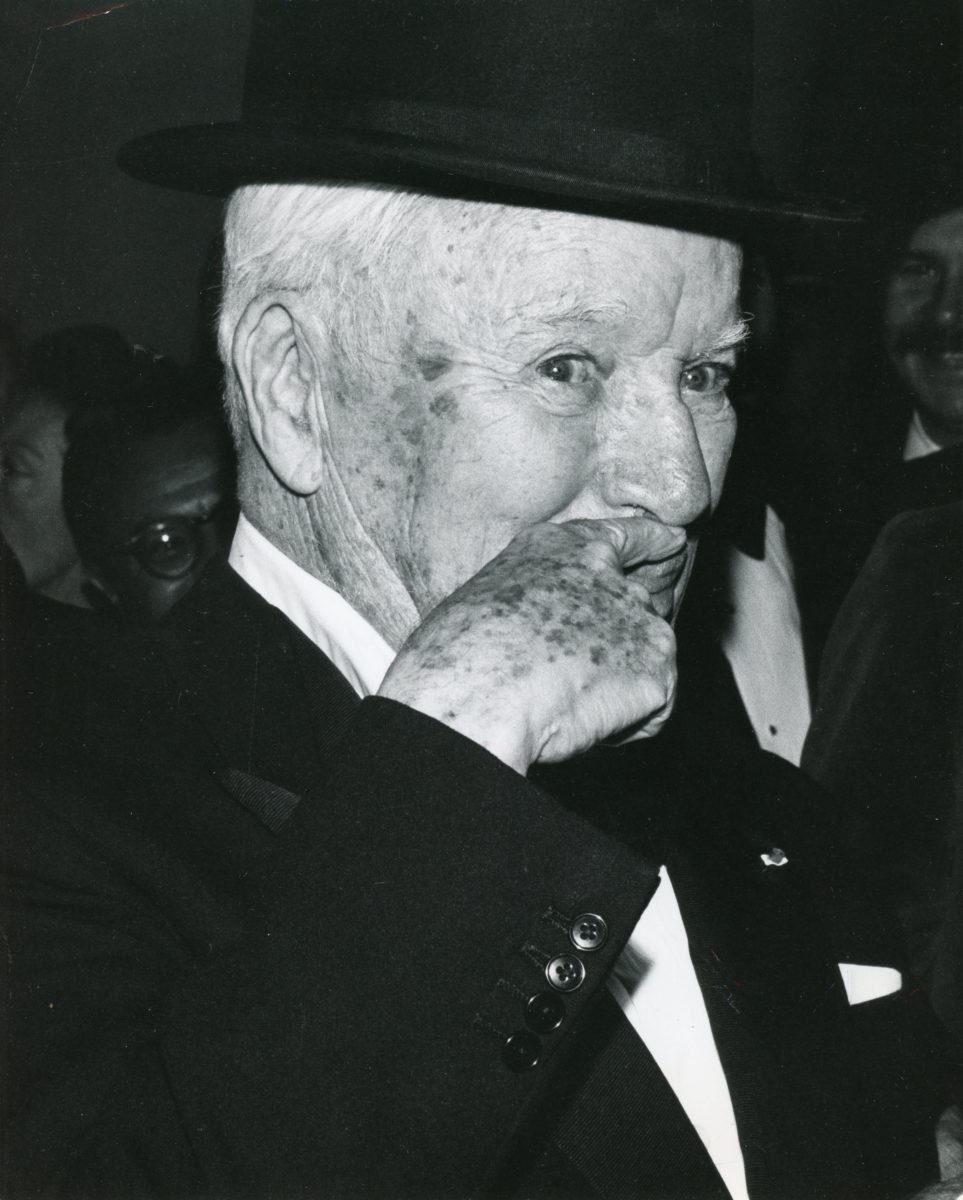
Chaplin salutes with his famous mustache.
New Directors/New Films Begins
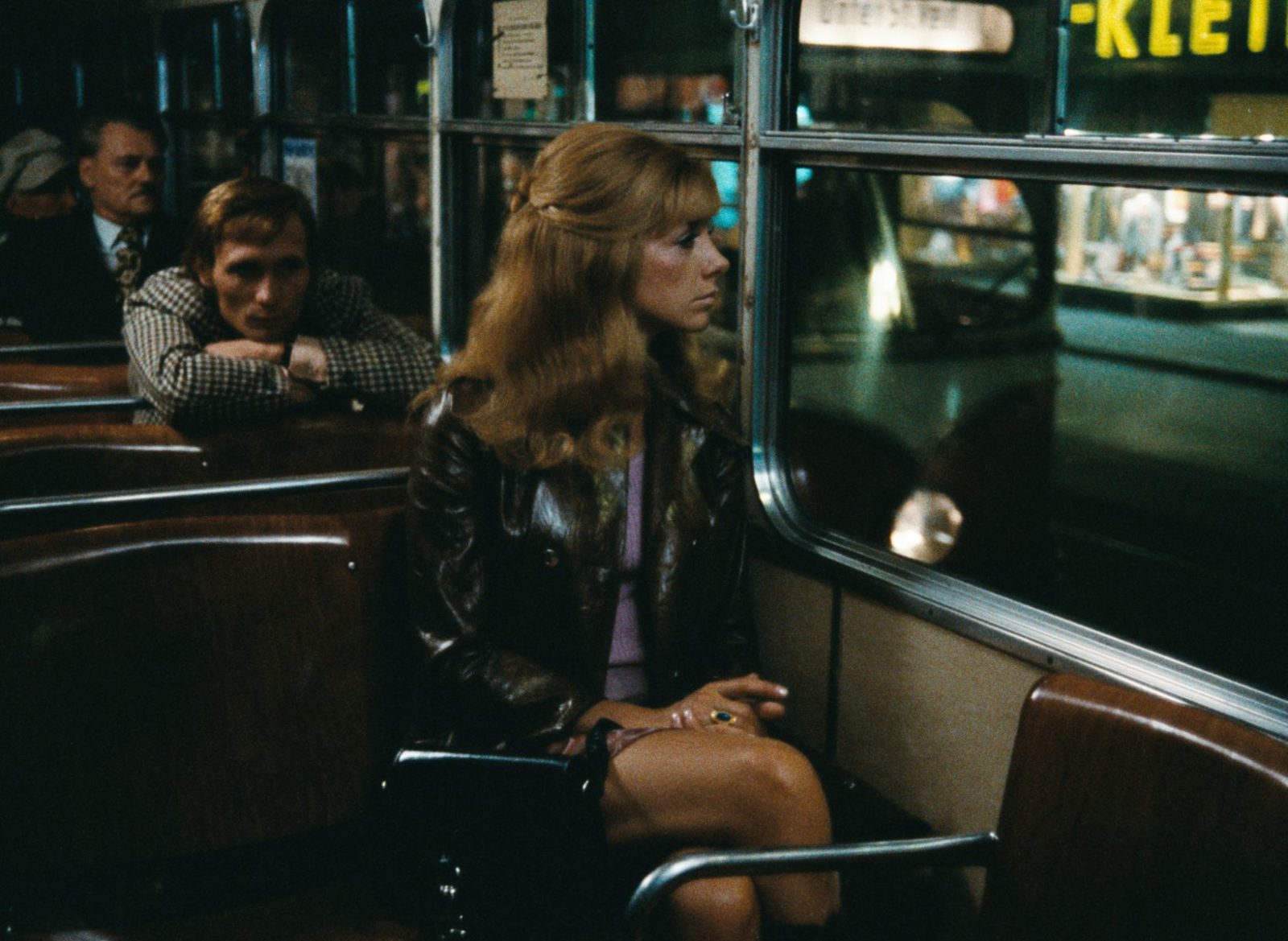
Wim Wenders’s The Goalie’s Anxiety at the Penalty Kick, a selection at the first ND/NF.
In the fall of 1971, the Film Society considered the feasibility of presenting a second film program in the spring. However, since Philharmonic and Alice Tully Halls proved too expensive for additional film programming, it was decided to explore the option of partnering with another institution. Richard Roud and Joanne Koch, then in the position of administrator, approached Museum of Modern Art’s Willard Van Dyke about the possible collaboration, inquiring about using MoMA’s theaters as the primary venue. The concept was to showcase films from up-and-coming filmmakers who might not be well-known enough for selection in the New York Film Festival, but whose work showed immense promise and vision. The first years of the New Directors/New Films festival were auspicious to say the least, featuring Steven Spielberg, Wim Wenders, Theo Angelopoulos, and Haile Gerima. The festival—now in its 48th edition—would continue to serve as a launching pad for an astonishing array of the best filmmakers from around the world, often being unveiled to U.S. audiences for the first time. The ever-growing list includes Chantal Akerman, Pedro Almodóvar, Ana Lily Amirpour, Andrea Arnold, Darren Aronofsky, Guillermo del Toro, Sara Driver, Luca Guadagnino, Marielle Heller, Agnieszka Holland, Hou Hsiao-hsien, Kirsten Johnson, Spike Lee, Terence Nance, Christopher Nolan, Idrissa Ouédraogo, Laura Poitras, Sarah Polley, Dee Rees, Kelly Reichardt, and Denis Villeneuve.
NYFF Debuts
NYFF10 Main Slate Selections
Chloe in the Afternoon (Eric Rohmer) with American Pie (Fred Mogubgub and Al Brodax) (Opening Night)
Last Tango in Paris (Bernardo Bertolucci) (Closing Night)
The Adversary (Satyajit Ray) with Silences (Predrag Golubovic)
L’Amour fou (Jacques Rivette)
The Assassination of Trotsky (Joseph Losey) with 100 (Peter Voigt)
Bad Company (Robert Benton) with Joshua & the Blob (John C. Lange) and White Grease (Barry Bialik)
The Discreet Charm of the Bourgeoisie (Luis Buñuel) with Two Marches (Dusan Povh)
Family Life (Ken Loach) with The Black Beach (John Bulmer)
Heat (Paul Morrissey) with The Prayer (Radivoj Gvozdanovic) and Make Love, Not War (Zlatko Grgic)
Images (Robert Altman) with The Collector (Milan Blazekovic)
The Inner Scar (Philippe Garrel) with Dangling Participle (Standish D. Lawder) and Judas (Vlatko Gilic)
The King of Marvin Gardens (Bob Rafelson) with Meatloaf (Don Cirillo)
Love (Károly Makk) with Façades (Suad Mrkonjic)
The Merchant of Four Seasons (Rainer Werner Fassbinder) with Sheila (Jeff Schwartz) with Sunday Breakfast (Peter Virsis)
Nathalie Granger (Marguerite Duras)
Red Psalm (Miklós Jancsó) with Behind the Wall (Krzysztof Zanussi)
Reminiscences of a Journey to Lithuania (Jonas Mekas) with Going Home (Adolfas Mekas)
A Sense of Loss (Marcel Ophuls)
Summer Soldiers (Hiroshi Teshigahara)
Tout va bien with A Letter to Jane (Jean-Luc Godard and Jean-Pierre Gorin)
Two English Girls (François Truffaut) with Fantoro & the Last Enforcer (Jan Lenica)
We Won’t Grow Old Together (Maurice Pialat) with An American Liaison (Robert Brennan)
1973
Fred Astaire Honored at the Chaplin Award Gala
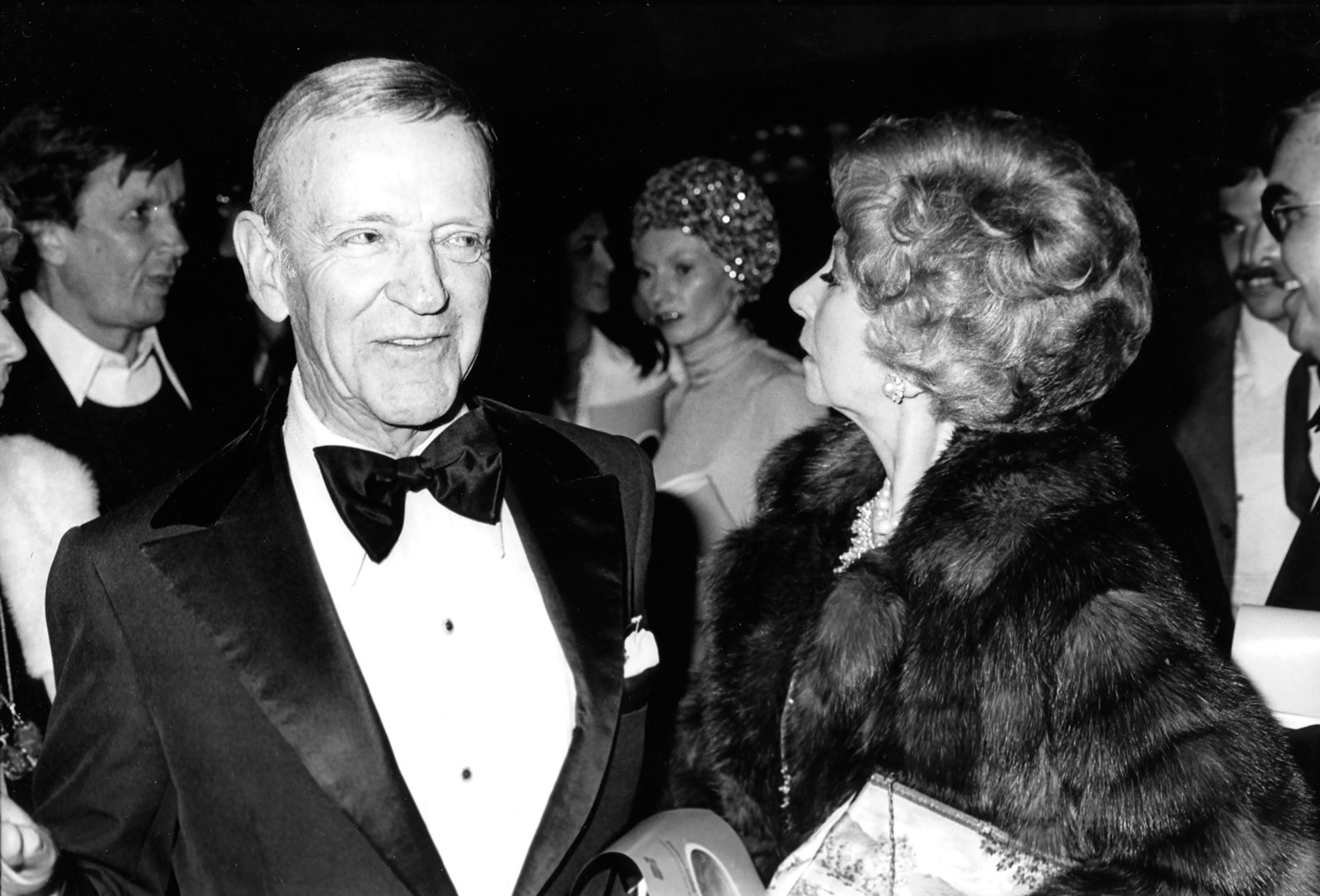
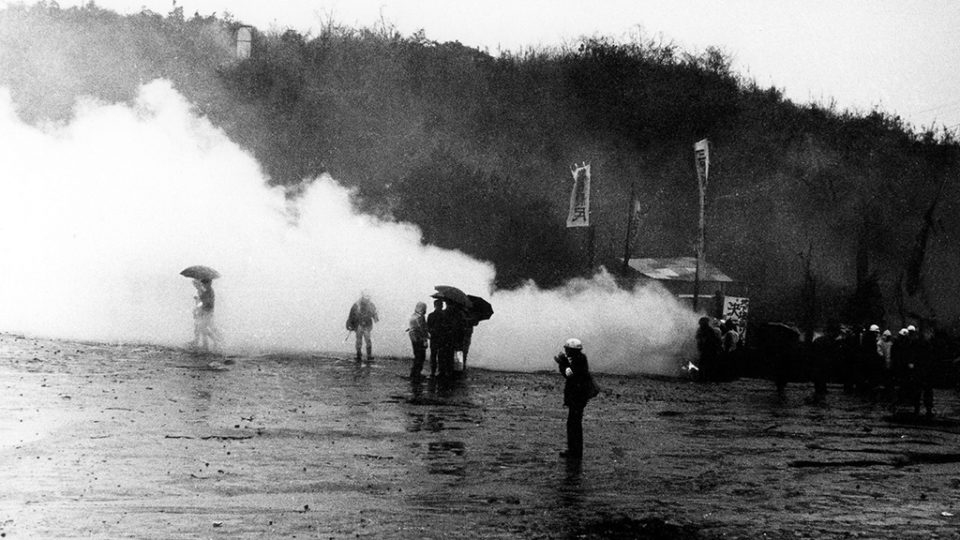
Read Jed Rapfogel on Shinsuke Ogawa’s Sanrizuka: Peasants of the Second Fortress, a ND/NF 1973 selection, for Film Comment:
From 1968-77, filmmaker Shinsuke Ogawa and his collaborators in the documentary collective Ogawa Productions made a cycle of six films depicting this conflict. The pinnacle of the series, and one of the most vital, committed, and convulsive of all docs, Sanrizuka: Peasants of the Second Fortress, chronicles the extraordinary methods the farmers devised in order to defend their homes.
NYFF Debuts
NYFF11 Main Slate Selections
Day for Night (François Truffaut) with Pierre (Dominique Cheminal) (Opening Night)
Badlands (Terrence Malick) with Frank Film (Frank Mouris) (Closing Night)
Andrei Rublev (Andrei Tarkovsky)
The Bitter Tears of Petra von Kant (Rainer Werner Fassbinder) with The Artichoke (Michel Clarence)
Distant Thunder (Satyajit Ray) with Alphon in Wonderland (Maxim Ferrier and Gerald Poussin) and Mediana (Scott Bartlett)
A Doll’s House (Joseph Losey) with Sandman (Eliot Noyes Jr.) and When Roobarb Made a Spike (Bob Godfrey)
Dr. Mabuse, the Gambler (Fritz Lang) (Retrospective selection)
History Lessons with Introduction to Arnold Schoenberg’s “Accompaniment to a Cinematographic Scene” (Jean-Marie Straub & Danièle Huillet)
Illumination (Krzysztof Zanussi) with Pulcinella (Giulio Gianini and Emanuele Luzzati) and For a Few Performances Only (Theodor Kalomirakis)
Israel Why (Claude Lanzmann)
Just Before Nightfall (Claude Chabrol) with Butterfly † 1975 (Peter Brouwer) and Colter’s Hell (Robin Lehman)
Kid Blue (James Frawley) with Pin Ball Wizard (Rod McCall)
Land of Silence and Darkness (Werner Herzog) with The Train That Never Stopped (Chris Marker/SLON)
Mean Streets (Martin Scorsese) with Background (Carmen D’Avino)
The Mother and the Whore (Jean Eustache)
La Rupture (Claude Chabrol) with Dans la vie (Pierre Veilleux)
Réjeanne Padovani (Denys Arcand) with Australian History (Bruce Petty)
Return (Gianni Amico) with Opera, Italy (Bruno Bozzetto) and Coming On (Doe Mayer)
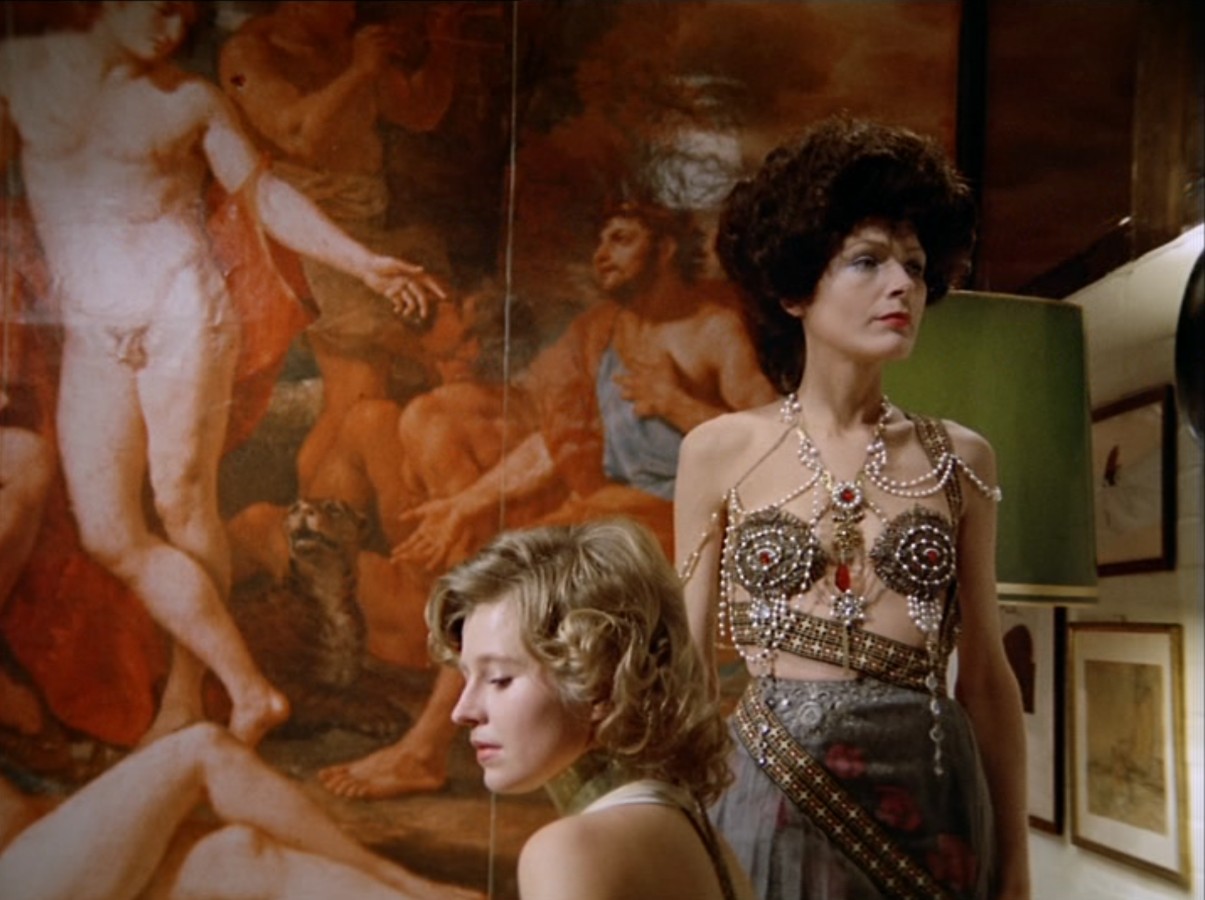
Matías Piñeiro on The Bitter Tears of Petra von Kant, from Film Comment‘s July-August 2016 issue:
Hermann’s performance feeds off a perverse kind of suspense: Marlene gets her power from her potential. By always having to acknowledge her presence on screen, the viewer has the feeling that Marlene might spring into dramatic action at any given moment. Drawing out that possibility for as long as possible allows Hermann to explore the ominous and painful paradox of love without demands.
1974
Film Comment Joins the Film Society of Lincoln Center
In 1974, the Film Society added to its growing programs stewardship of the esteemed Film Comment. Joanne Koch had gotten to know the magazine’s then-editor Richard Corliss, who served on the New York Film Festival Selection Committee, and proposed the idea of taking over the publication to an equally enthusiastic Board of Directors. Film Comment had been formed under editor Gordon Hitchens in 1962 (originally titled Vision for its first two issues), and from that point forward was a source for the smartest movie criticism in the United States. The writers who have appeared in its pages over the years form a veritable who’s who of the most important critical minds in the field, including Roger Ebert, Molly Haskell, J. Hoberman, Marcia Pally, Andrew Sarris, Amy Taubin, Armond White, and Robin Wood. Currently edited by Nicolas Rapold, Film Comment remains an essential voice of the organization in the 21st century, now encompassing a vibrant website and podcast as well as live talks and special screening events.
ND/NF Debuts
Alfred Hitchcock Honored at the Chaplin Award Gala
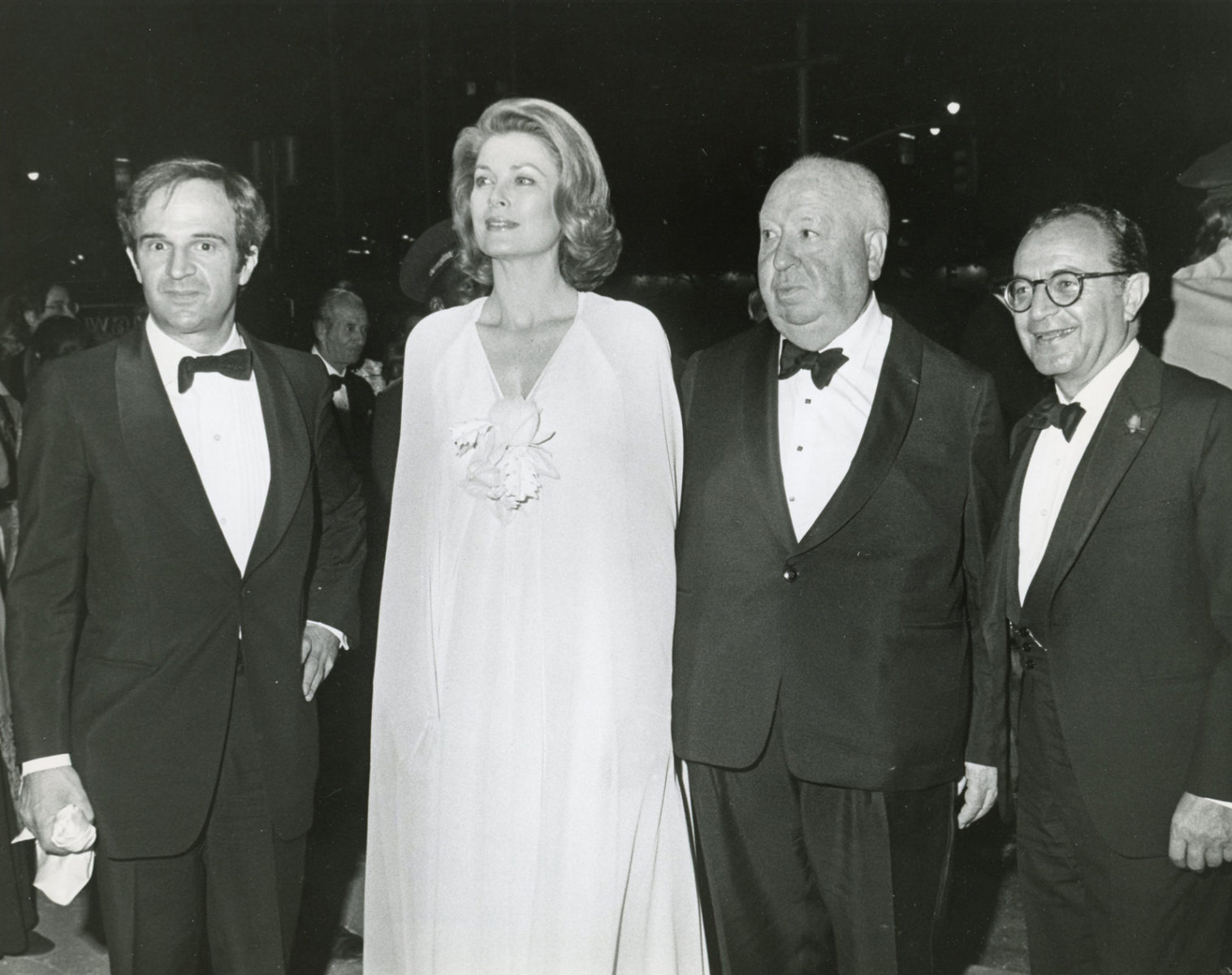
NYFF Debuts
NYFF12 Main Slate Selections
Don’t Cry with Your Mouth Full (Pascal Thomas) (Opening Night) with A Bird’s Life (H. Born, J. Doubrava, and Milos Macourek)
The Phantom of Liberty (Luis Buñuel) (Closing Night)
Alice in the Cities (Wim Wenders) with Punishment, The Netherlands (Olga Madsen)
Ali: Fear Eats the Soul (Rainer Werner Fassbinder) with Jabberwocky (Jan Svankmajer)
A Bigger Splash (Jack Hazan) with Braverman’s Condensed Cream of Beatles (Charles Braverman)
Céline and Julie Go Boating (Jacques Rivette)
The Circumstance (Ermanno Olmi) with Diary Found with the Ants (George Sénéchal)
Les Enfants terribles (Jean-Pierre Melville) (Retrospective selection)
Lacombe Lucien (Louis Malle)
Lancelot du Lac (Robert Bresson) with Sea Creatures (Robin Lehman)
Liebelei (Max Ophuls) (Retrospective selection)
The Middle of the World (Alain Tanner) with Optimist and Pessimist (Zlatko Grgic)
The Night of the Scarecrow (Sérgio Ricardo) with Along These Lines (Peter Pearson)
Out 1: Spectre (Jacques Rivette)
La Paloma (Daniel Schmid) with Superior Force (Zlatko Pavlinic) and Oh! Oh!, Poland (Bronislaw Zeman)
Part-Time Work of a Domestic Slave (Alexander Kluge) with The Bench of Desolation (Claude Chabrol)
Rome Wants Another Caesar (Miklós Jancsó) with
“Roots”—a program of four featurettes celebrating the contribution of many ethnic strands to the fabric of American Life: Yudie (Mirra Bank), Old-Fashioned Woman (Martha Coolidge), From These Roots (William Greaves), and Italianamerican (Martin Scorsese)
“Homage to Buñuel”: L’Age d’Or, The Exterminating Angel, The Milky Way, The Discreet Charm of the Bourgeoisie (Luis Buñuel) (Retrospective selection)
Light (Jordan Belson)
Stavisky… (Alain Resnais)
A Woman Under the Influence (John Cassavetes)
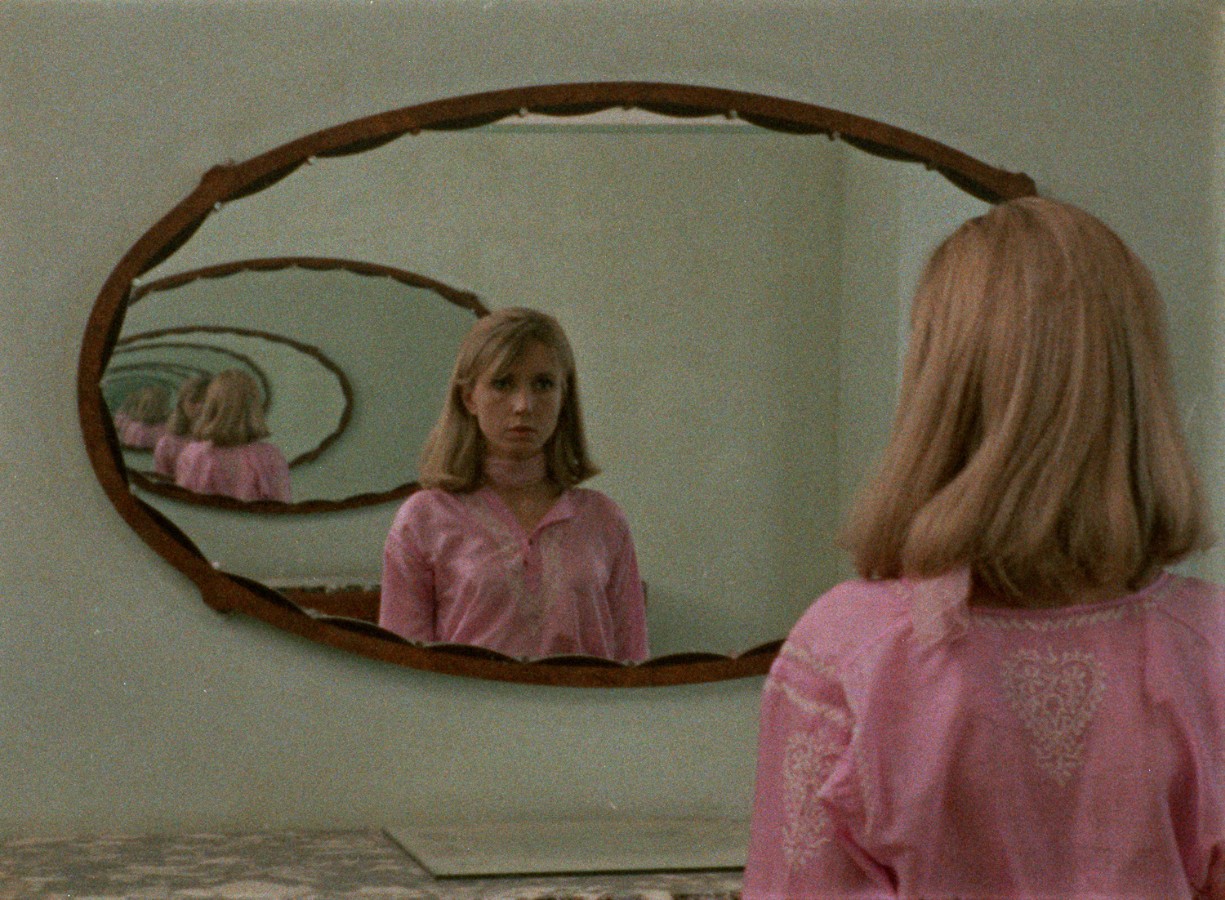
Jonathan Romney on Out 1 for Film Comment:
Jacques Rivette’s Out 1 is one of the legendary “impossible objects” of modern cinema, and for a long time was one of the great (almost) unseen films. The result of six weeks’ shooting and six months’ editing, it was originally shown only once, in a work print, in Le Havre in September 1971 (reputedly, the projector broke down). It later resurfaced in the late Eighties and early Nineties, and has even become available on DVD, but there’s no substitute for immersing yourself in a big-screen projection, which is now possible thanks to the film’s restoration.
1975
Joanne Woodward & Paul Newman Honored at the Chaplin Award Gala
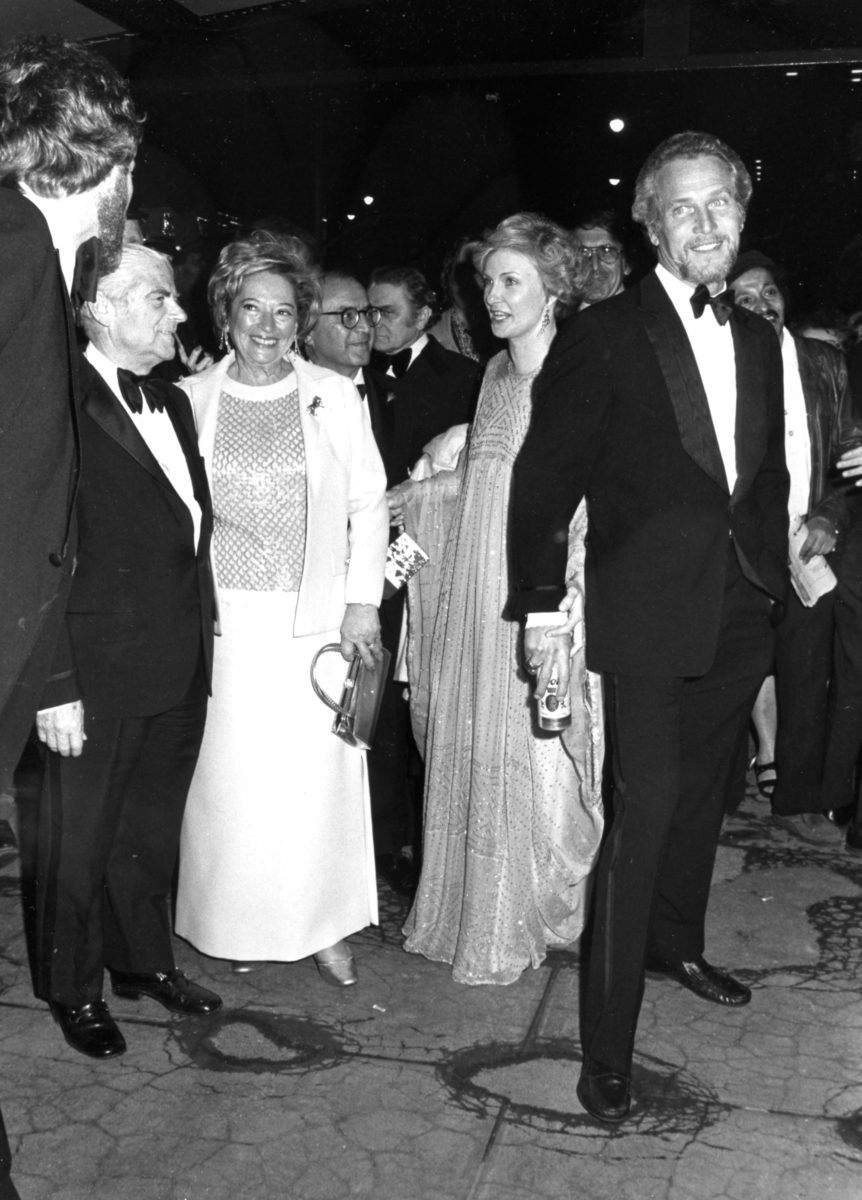
NYFF13 Main Slate Selections
Conversation Piece (Luchino Visconti) (Opening Night)
The Story of Adèle H. (François Truffaut) with The Imprint (Jacques Cardon) (Closing Night)
Autobiography of a Princess (James Ivory) with Compañero: Victor Jara of Chile (Stanley Forman & Martin Smith)
Black Moon (Louis Malle) with Thanksgiving (Ken Wallace) and Cycles (Stephen Beck and Jordan Belson)
La Chienne (Jean Renoir) (Retrospective selection)
Electra, My Love (Miklós Jancsó) with Fuji (Robert Breer) and Screentest (Frank Mouris and Caroline Ahlfors Mouris)
The Enigma of Kaspar Hauser (Werner Herzog) with Homage to Magritte (Anita Thacher)
Exhibition (Jean-François Davy) with Café Bar (Alison de Vere)
F for Fake (Orson Welles) with Arthur and Lillie (Kris Samuelson)
Fox and His Friends (Rainer Werner Fassbinder) with Way Out (Ted Rockley)
French Provincial (André Téchiné) with Classical Cartoon (Bill Mather)
Grey Gardens (Albert Maysles & David Maysles & Ellen Hovde & Muffie Meyer) with Longing for Darkness (Peter Beard)
Hearts of the West (Howard Zieff) with The Unanimous Declaration of the 13 United States of America (A.P. Ferullo and R.A. Mayes)
India Song (Marguerite Duras)
The Lost Honor of Katharina Blum (Volker Schlöndorff & Margarethe von Trotta) with Don’t (Robin Lehman)
Milestones (Robert Kramer & John Douglas)
Moses and Aaron (Jean-Marie Straub & Danièle Huillet)
Smile (Michael Ritchie)
The Wonderful Crook (Claude Goretta) with This Is Not a Museum (John Haugse)
Xala (Ousmane Sembène)
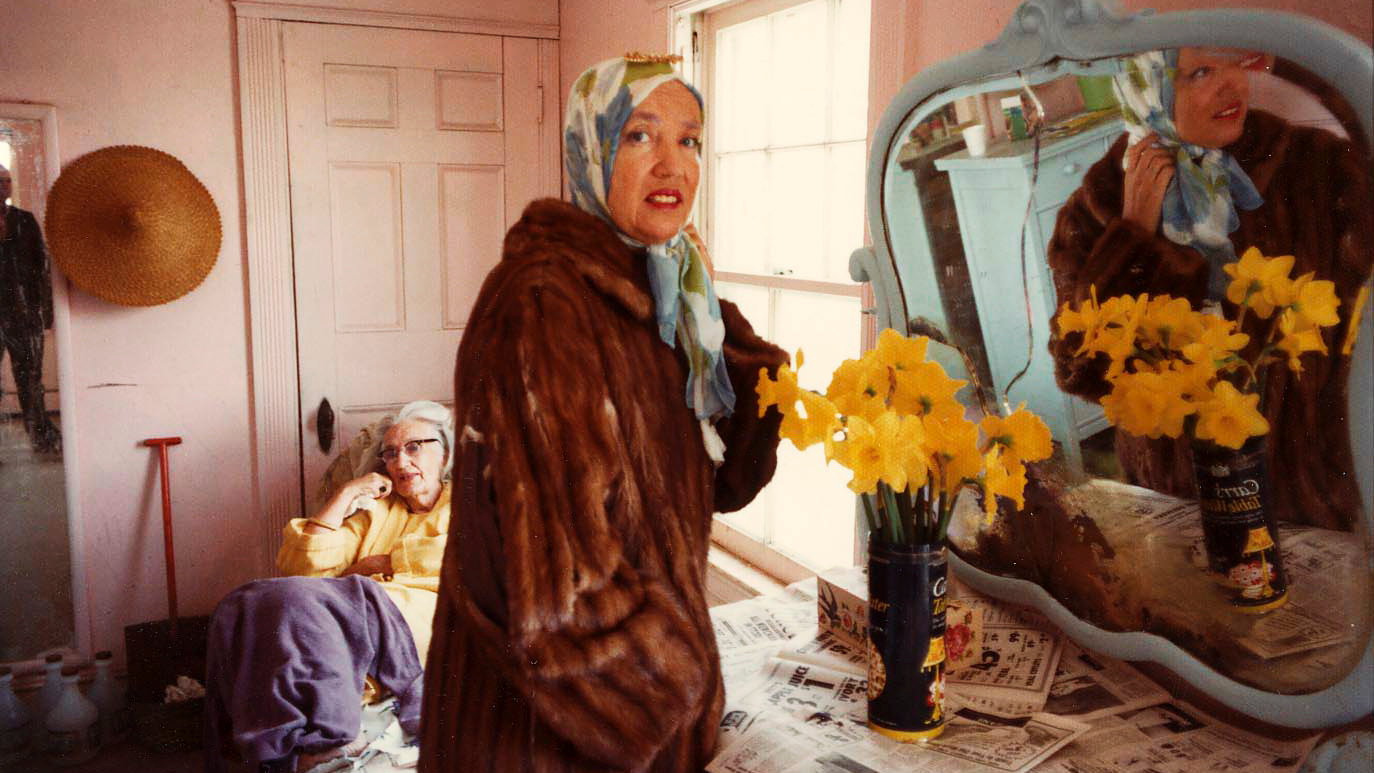
Film Comment‘s Charles Michener on Grey Gardens, from the September-October 1975 issue:
Cinéma vérité, which has fallen into low estate in recent years—thanks to the likes of public television’s An American Family—is triumphantly vindicated by Albert and David Maysles’s Grey Gardens, an extraordinarily crafty invasion into the lives of Edith Beale and her daughter Edie, better known as Jacqueline Onassis’s impoverished aunt and first cousin, whose own fallen estate in East Hampton, Long Island, made gossipy headlines a few years ago. After a Wellesian nod to those headlines and the local scandal that generated them, and after a graceful, passing admission of their own presence as filmmakers, the Maysles brothers prowl the dilapidated Beale manse with an unblinking cool—underscored by an ironic, growing compassion—that achieves what cinéma vérité aims for but seldom conveys: a sense that the material is telling itself.
1976
NYFF Debuts
NYFF14 Main Slate Selections
Small Change (François Truffaut) with Doubletalk (Alan W. Beattie) (Opening Night)
The Marquise of O… (Eric Rohmer) with Sweet Sounds (James Ivory, Ismail Merchant, and Richard Robbins) (Closing Night)
Dersu Uzala (Akira Kurosawa)
Duelle (Jacques Rivette) with Nightlife (Robin Lehman)
Fear of Fear (Rainer Werner Fassbinder) with Organism (Hilary Harris)
Harlan County, U.S.A. (Barbara Kopple) with Steelworkers from Village Borovica Gornja (Mirjana Zizkovic)
Illustrious Corpses (Francesco Rosi)
In the Realm of the Senses (Nagisa Oshima) with In a Rehearsal Room (David Hahn)
Due to a run-in with U.S. Customs, this is the only time in NYFF history that we were unable to show a scheduled film. It was later screened at MoMA .
Jonah Who Will Be 25 in the Year 2000 (Alain Tanner) with No Noise (Carmen D’Avino)
Kings of the Road (Wim Wenders)
The Memory of Justice (Marcel Ophuls)
The Middleman (Satyajit Ray)
Nana (Jean Renoir) (Retrospective screening)
Ossessione (Luchino Visconti) (Retrospective screening)
Sérail (Eduardo de Gregorio) with Women’s Answers (Agnès Varda)
The Story of Sin (Walerian Borowczyk)
Strongman Ferdinand (Alexander Kluge) with Two Cops (Charles Braverman)
A Touch of Zen (King Hu)
“Rites of Passage”: Sunday Funnies (Ray Karp), In the Region of Ice (Peter Werner), and Bernice Bobs Her Hair (Joan Micklin Silver)
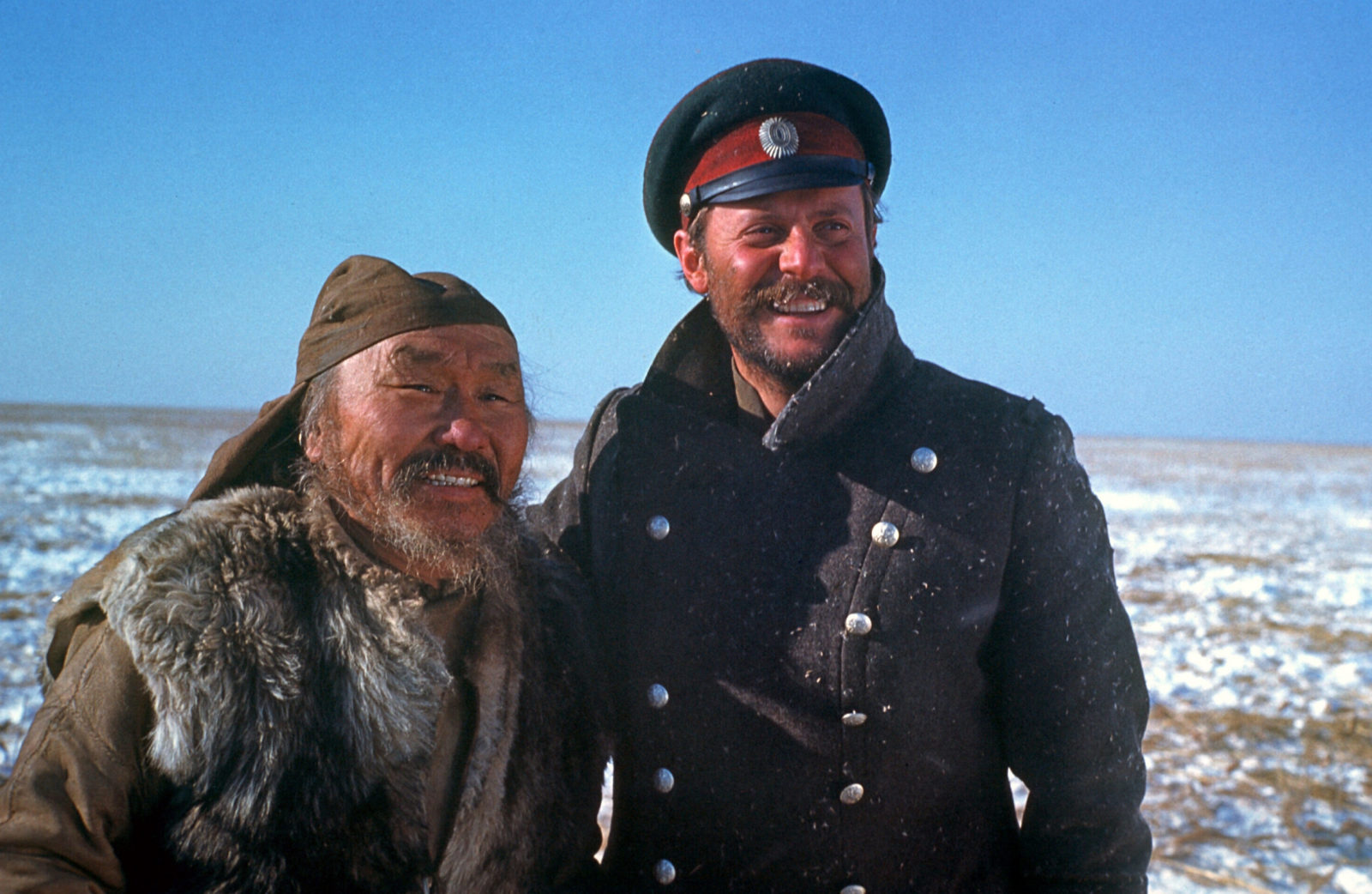
Read a pair of wrap-ups of the the 14th New York Film Festival, by James McCourt and Elliott Stein, for Film Comment‘s November-December 1976 issue:
Akira Kurosawa’s favorite directors are Ford, Wyler, Capra, and Antonioni. One of his pet recollections is a meeting with Ford in London: the American director sent the Japanese director chrysanthemums “and treated me just like his own son.” Dersu Uzala (★★★★) is Kurosawa’s most Fordian picture since Yojimbo (1961) and seemed the only new film in this year’s festival to be marked by a breath of greatness.
1977
ND/NF Debut
NYFF Debut
NYFF15 Main Slate Selections
One Sings, the Other Doesn’t (Agnès Varda) with Music of the Spheres (Jordan Belson) (Opening Night)
That Obscure Object of Desire (Luis Buñuel) with Kudzu (Marjie Short) (Closing Night) (Closing Night)
1900 (Bernardo Bertolucci)
The American Friend (Wim Wenders)
Le Camion (Marguerite Duras) with Grandpa (Paul Desaulniers and Stephen L. Forman)
The Devil, Probably (Robert Bresson) with Glove Story (Eli Noyes)
L’Enfant de Paris (Léonce Perret) (Retrospective screening)
Handle with Care (Jonathan Demme) with Froggie Went A-Courtin’ (Frank Gladstone)
Heart of Glass with La Soufriere (Werner Herzog)
Hot Tomorrows (Martin Brest) with My Grandmother (Kote Mikaberidze) (Retrospective screening)
The Lacemaker (Claude Goretta)
The Man Who Loved Women (François Truffaut)
Men of Bronze (Bill Miles) with Children of Labor (Noel Buckner, Mary Dore, Richard Broadman, Al Gedicks)
Omar Gatlato (Merzak Allouache) with Striptease (Bruno Bozzetto and Guido Manuli)
Padre Padrone (Paolo & Vittorio Taviani)
Pafnucio Santo (Rafael Corkidi) with Nightmare (Aleksandar Marks)
Roseland (James Ivory) with Part of Your Loving (Tony De Nonno)
Saló, or the 120 Days of Sodom (Pier Paolo Pasolini)
Short Eyes (Robert M. Young)
Tent of Miracles (Pereira dos Santos)
Women (Márta Mészáros) with What I Did Not Tell the Prince (Jiri Brdecka) and Single Fathering (Ron Taylor)
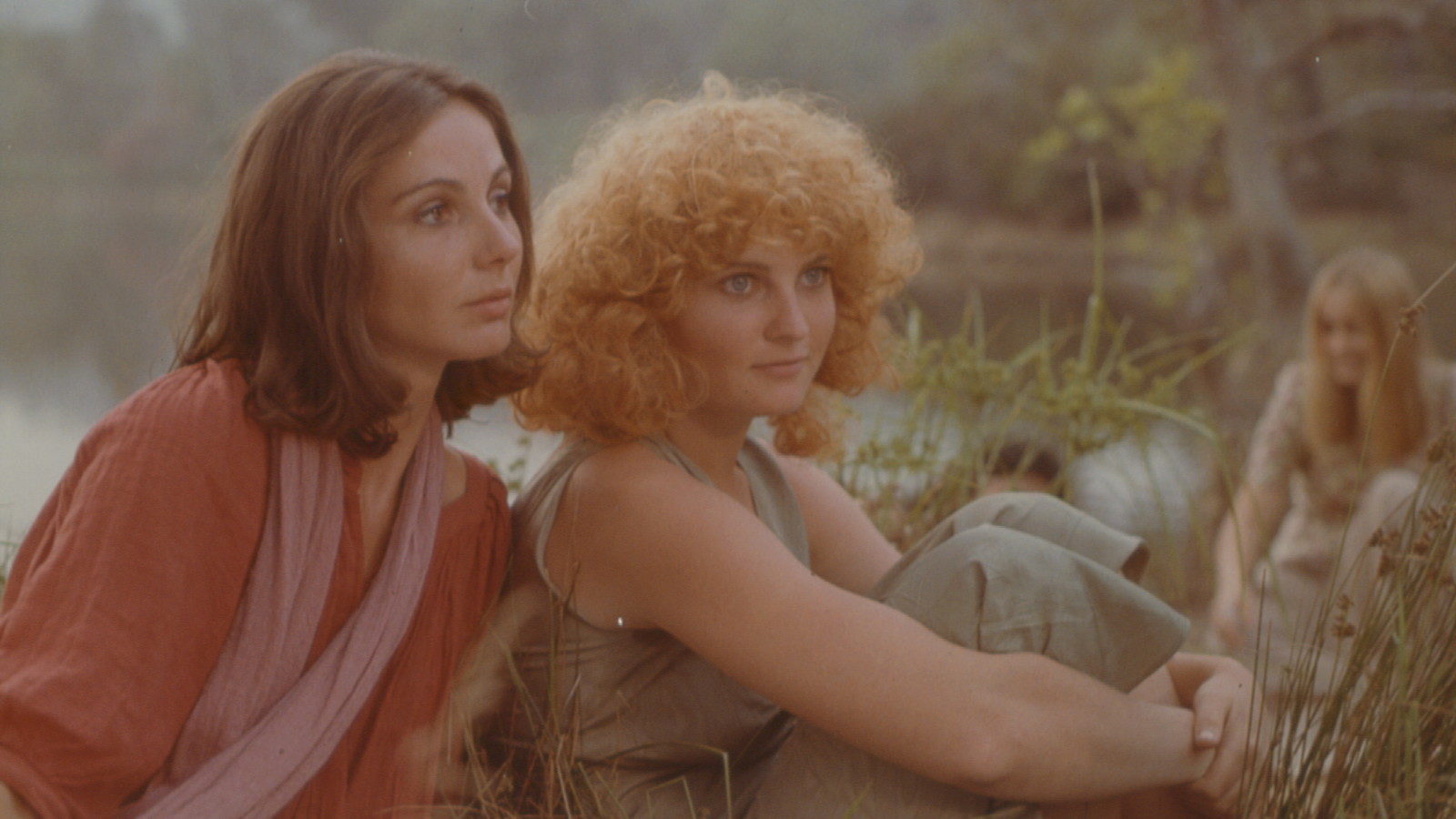
Read Jonathan Romney on Agnès Varda’s NYFF15 opener One Sings, the Other Doesn’t for Film Comment:
Varda described One Sings, the Other Doesn’t as a musical, although it’s much less convincing in those terms than her 1962 feature Cléo from 5 to 7, which featured the heroine singing to piano accompaniment from Michel Legrand. One Sings, the Other Doesn’t really feels more like a chronicle, a novelistic mini-saga that follows two women living their lives in parallel but sometimes coming together, from 1962 to an epilogue set 14 years later.
1978
George Cukor Honored at the Chaplin Award Gala
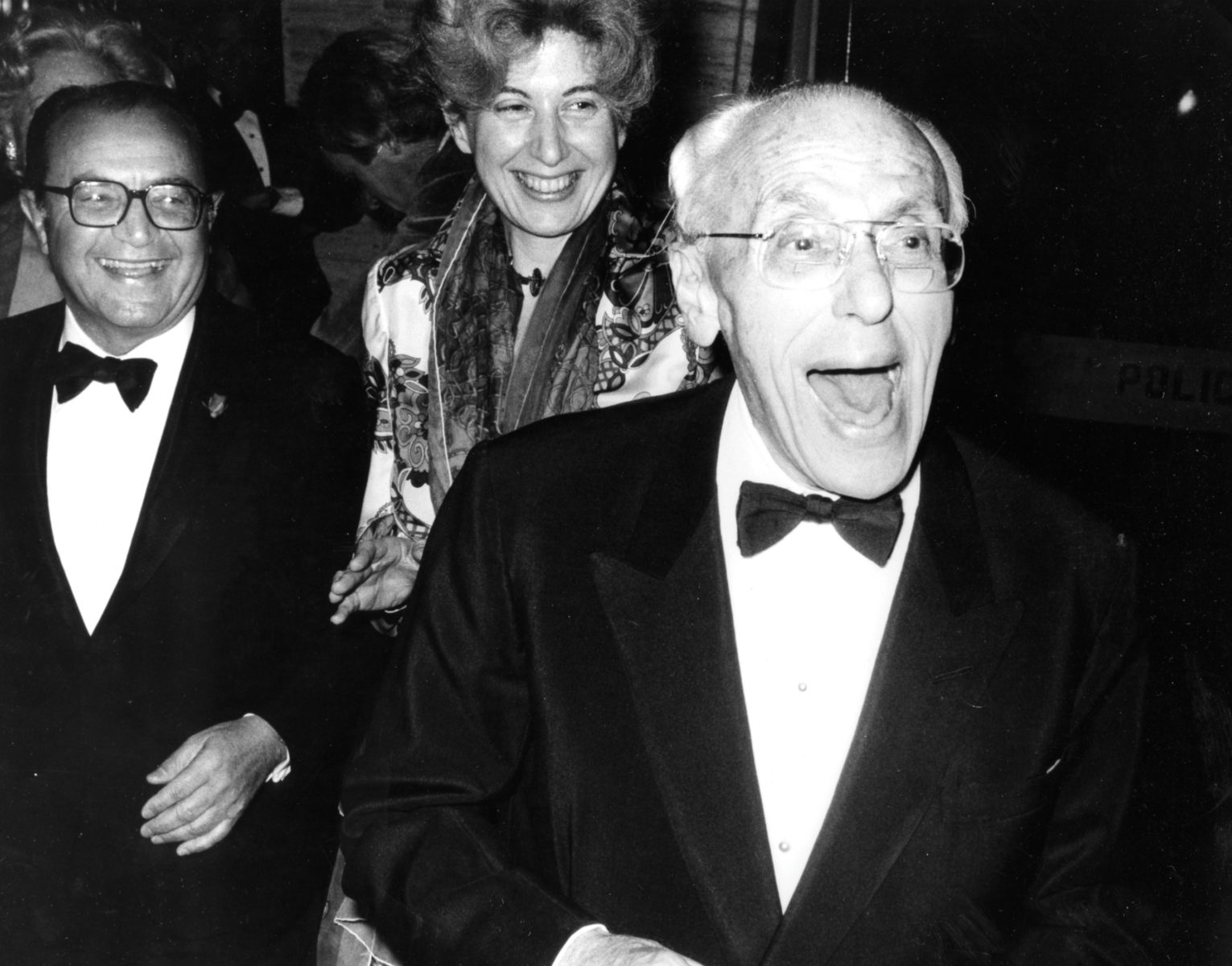
Read Andrew Sarris’s salute to George Cukor from Film Comment‘s March-April 1978 issue:
I met George Cukor only once in my life, and then only very briefly, but I have enjoyed the movies he directed through most of my other life up there on the screen, and I thought that I had written both appreciatively and perceptively of his career as a whole in The American Cinema. Nonetheless, I felt a distinct chill in his very perfunctory greeting, and I must say that I was not entirely surprised. Despite my great affection and admiration for much of the maligned output of Hollywood, I have never gone out of my way to meet its artists and craftsmen. For one thing, I have always lacked both the talent and the temperament to function as a tape-recorder critic. For another, I consider it a form of cheating to check my critical insights with the horse’s mouth. The evidence on the screen should be sufficient.
NYFF Debuts
NYFF16 Main Slate Selections
A Wedding (Robert Altman) (Opening Night)
Violette Nozière (Claude Chabrol) (Closing Night)
American Boy (Martin Scorsese) with Movies Are My Life (Peter Hayden)
The Apple Game (Vera Chytilová) with Eggs (Ruth C. Hayes)
Bloodbrothers (Robert Mulligan)
Camouflage (Krzysztof Zanussi) with The Discipline of D.E. (Gus Vant Sant)
Despair (Rainer Werner Fassbinder)
Dossier 51 (Michel Deville) with Duane Michals (1939-1997) (Theodore Haimes and Ed Howard)
Elective Affinities (Gianni Amico)
Gates of Heaven (Errol Morris) with Manimals (Robin Lehman) and The Dogs (Aviva Slesin)
Get Out Your Handkerchiefs (Bertrand Blier)
The Green Room (François Truffaut) with Going Out of Business (Christopher Gamboni)
The Left-Handed Woman (Peter Handke)
Like a Turtle on Its Back (Luc Béraud)
The Miracle of the Wolves (Raymond Bernard) (Retrospective screening)
Newsfront (Phillip Noyce)
Perceval le Gallois (Eric Rohmer)
The Shout (Jerzy Skolimowski) with Valse Triste (Bruce Conner) and Sea Travels (Anita Thacher)
Skip Tracer (Zale R. Dalen) with Bruce & His Things (Mike Haller)
Spies (Fritz Lang) (Retrospective screening)
“Styles of Radical Will” — with a title borrowed by Susan Sontag, these three films investigate various aspects of contemporary politics: CIA: Case Officer (Saul Landau), They Are Their Own Gifts (Lucille Rhodes & Margaret Murphy), and With Babies and Banners: Story of the Women’s Emergency Brigade (Lorraine Gray)
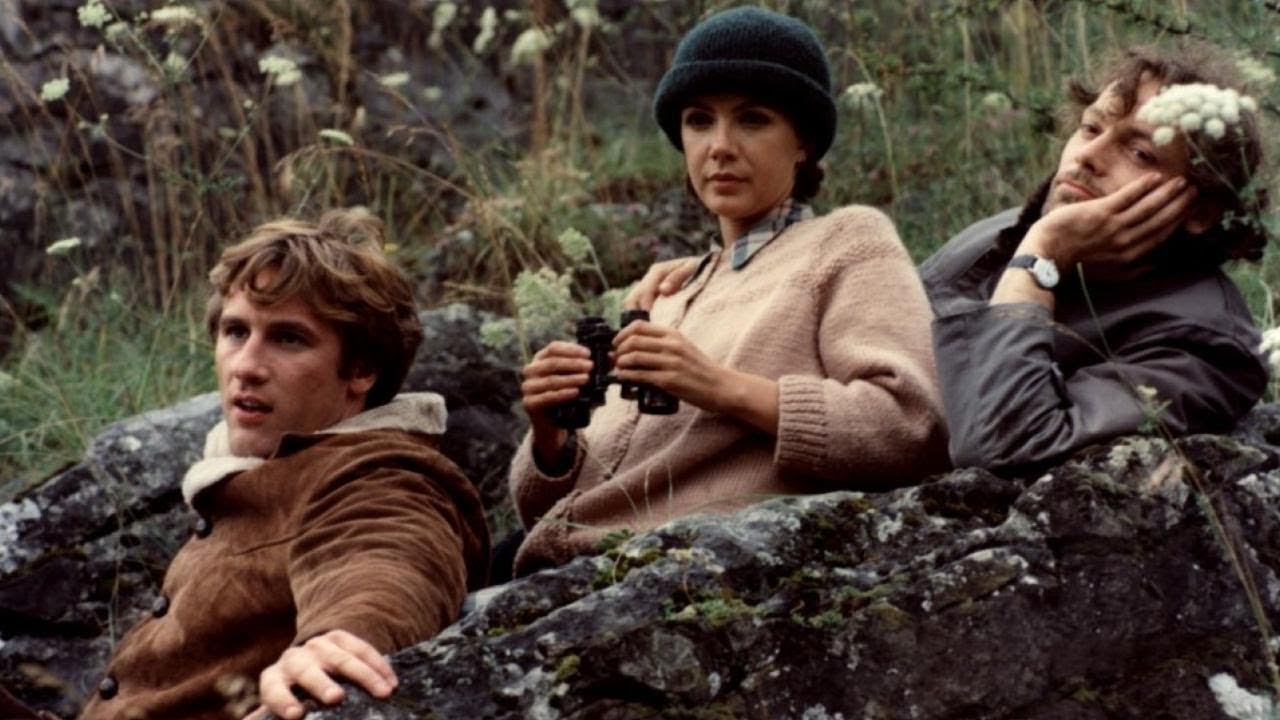
Read Elliott Stein’s wrap-up of the the 16th New York Film Festival, for Film Comment‘s November-December 1978 issue:
Members of the festival committee were reported at each other’s throats over Bertrand Blier’s Get Out Your Handkerchiefs. At the issue of the press screening it was The Kleenex War, Montagues and Capulets, Guelphs and Ghibellines all over again. If you liked Get Out Your Handkerchiefs, you were a male chauvinist bourgeois fascist piggy. If you were a woman and liked it you were a masochistic piggy. It was, admittedly, less a war than an act of pure aggression on the part of the antis—most of the pros just stood around with their mouths wide open with little idea of what all the fuss was about.
1979
Bob Hope Honored at the Chaplin Award Gala
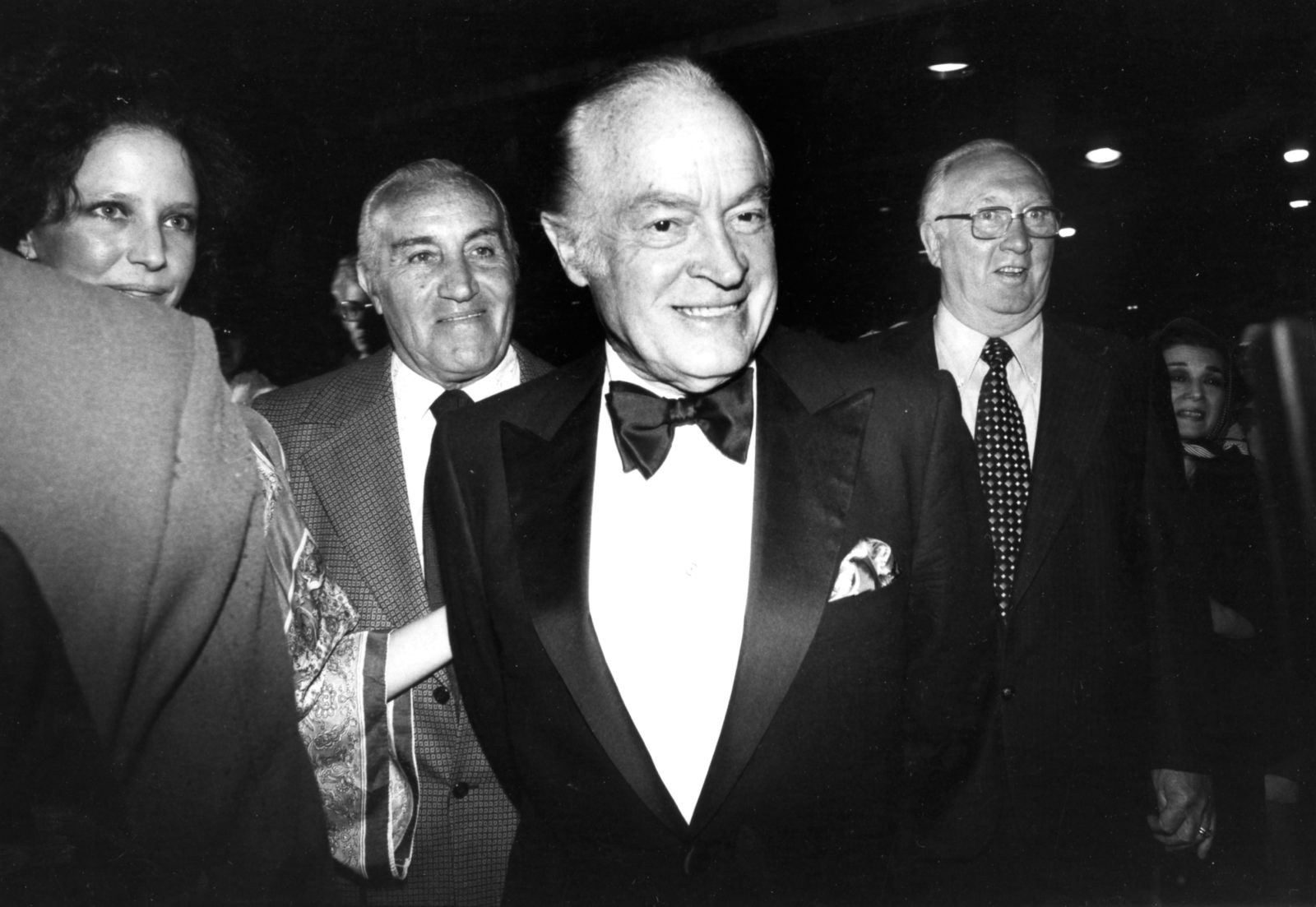
ND/NF Debuts
Read Michael Koresky’s Queer & Now & Then column on Chantal Akerman’s Les Rendez-vous d’Anna for Film Comment:
Fixated on staircases, windows, trains, waiting platforms, and hotel rooms, Les Rendez-vous d’Anna is a film of thresholds. Our disconnected main character this time is Anna, played with unsettled restraint by Aurore Clément. We first see her, as we often will, from a distance. In her typically static opening shot, Akerman shows us a mostly empty train station in a German town; eventually a train pulls up to the track on the right, and Anna emerges unceremoniously, the camera not in any hurry to spot her as she moves to a phone booth in the back of the center frame. After making a call we are not privy to hear, she walks in the direction of the camera before descending the staircase that has been lying in wait in the foreground. Already, Anna has been established in purely formal terms, as someone clearly far from home, whose destination is unclear to us, and who is somehow one with her modern surroundings: a place of entrances and exits, cold, transitory.
NYFF Debuts
NYFF17 Main Slate Selections
La Luna (Bernardo Bertolucci) (Opening Night)
The Marriage of Maria Braun (Rainer Werner Fassbinder) (Closing Night)
Alexandria… Why? (Youssef Chahine)
Angi Vera (Pal Gabor) with Since ’45 (Michael Korolenko)
Best Boy (Ira Wohl) with LMNO (Robert Breer)
Black Jack (Ken Loach) with Every Child (Eugene Fedorenko)
The Black Stallion (Carroll Ballard)
The Bugs Bunny/Road Runner Movie (Chuck Jones)
The Europeans (James Ivory) with Impasse (Frank and Caroline Mouris)
The Golden Coach (Jean Renoir) (Retrospective screening) with Jean Renoir’s Direction of Actors (Gisèle Braunberger)
In a Year of 13 Moons (Rainer Werner Fassbinder)
Molière (Ariane Mnouchkine)
My Brilliant Career (Gillian Armstrong) with The Bronswik Affair (Robert Awad and André Leduc)
Nosferatu the Vampyre (Werner Herzog) with Euclidean Illusions (Stan VanDerBeek)
Other People’s Money (Christian de Chalonge) with Special Delivery (Eunice Macaulay and John Weldon)
Peeping Tom (Michael Powell) (Retrospective screening)
Primal Fear (Anne Claire Poirier) with Pretend You’re Wearing a Barrel (Jan-Marie Martell)
Short Memory (Eduardo de Gregorio)
Wise Blood (John Huston) with Why Me? (Derek Lamb and Janet Perlman)
Without Anesthesia (Andrzej Wajda)
The Wobblies (Stewart Bird & Deborah Shaffer) with Modeling the Universe (Jaime Snyder)
The Young Girls of Wilko (Andrzej Wajda)
“Howard Hughes Presents…”: Scarface (Howard Hawks) and The Sin of Harold Diddlebock (Preston Sturges) (Retrospective screenings)
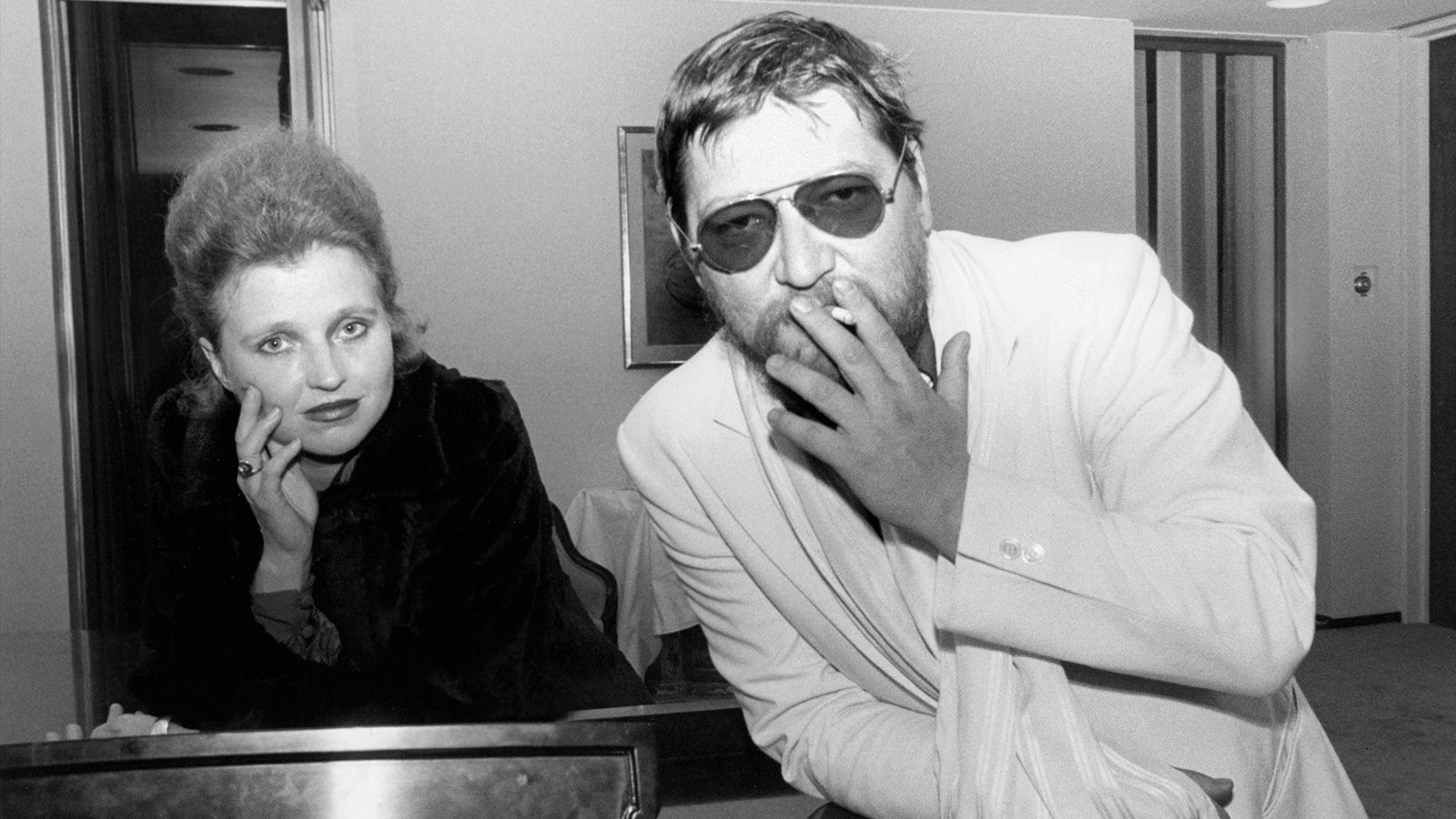
Hanna Schygulla and Rainer Werner Fassbinder in 1979 at the 17th NYFF. Photo by Helaine Messer.





